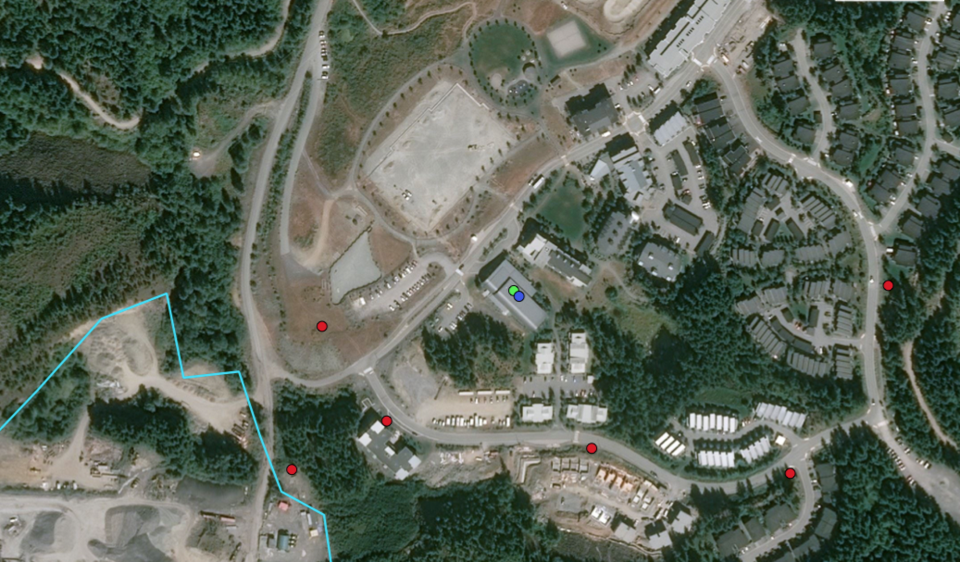Whistler council has voted to continue procuring asphalt from Alpine Paving’s Cheakamus Crossing plant for the next two years, while agreeing to expand the Resort Municipality of Whistler’s (RMOW) air quality-monitoring efforts within the area.
The move comes one year after council decided in a split vote to change its longstanding asphalt procurement policy to allow sourcing from the Cheakamus Crossing plant, with the stipulation that council reconsider the issue in a year’s time.
From 2011 until last year, council prohibited RMOW staff from sourcing asphalt from any facilities located within three kilometres of Whistler neighbourhoods—meaning the municipality instead hauled its asphalt up Highway 99 from Alpine Paving’s plant in Squamish.
The policy was originally enacted to appease voters who opposed the presence of an asphalt plant so close to a residential neighbourhood.
That decision resulted in nearly 270 tonnes of CO2 being emitted over nine years—representing between two and five per cent of the municipality’s annual corporate emissions, depending on the year—and cost an estimated $456,000 more than if it were sourced locally over that time, according to the RMOW.
Procuring 2,036 tonnes of asphalt from the Whistler plant in 2020 rather than its counterpart in Squamish saved the municipality more than $20,000 and prevented approximately 12 tonnes of CO2 from being emitted into the atmosphere last year, RMOW capital projects manager Tammy Shore told council at its July 20 meeting.
Sourcing asphalt locally also results in other indirect savings, Shore explained.
“There’s a schedule of repairing our roads in a timely manner. There [are] challenges for staff and vendors that work for us in getting asphalt because the Squamish plant does not always open, and it’s frequently broken down because it is an older plant,” Shore said. “[The RMOW] maintains 80 kilometres of road so it does become an issue.”
The other indirect cost shows up over the longer term, she explained, as procuring asphalt from a farther distance lessens the quality of the product. Asphalt hauled in from Squamish is cooler than asphalt produced in Whistler, Shore said, “and it generally doesn’t last as long, because asphalt is best placed when it’s hot.”
While the RMOW didn’t purchase asphalt from the Cheakamus Crossing plant for almost a decade, the site remained in operation to provide asphalt to clients like the Ministry of Transportation and Infrastructure, private landowners, and other local governments surrounding Whistler.
Despite working with Alpine Paving in 2020 to pave the access road to the gravel quarry in an effort to reduce dust and noise in the area, the municipality received five letters of opposition from the community members—four sent in 2021 and one sent a year ago—voicing general concerns about possible air pollution resulting from the plant.
“I am writing to voice my STRONG opinion that Whistler Resort Municipality NOT procure any asphalt from the Alpine Paving plant in Cheakamus Crossing,” wrote Laura Church earlier this month.
“I don’t care if it costs twice as much to procure from someone else. I don’t care whatsoever. For all I care we can move to engineered dirt roads if that’s what it takes. We have nothing if we don’t have our homes, our families, and our health—and this issue affects all those three things.”
The RMOW has been monitoring air quality in Cheakamus Crossing since 2010. Assessments show that air quality continued to meet provincial standards even on days the plant was operating, except during short periods when significant forest fires were burning nearby.
Whistler council accepted RMOW staff’s recommendation to alter the particulate matter concentration detection of the municipality’s existing air monitoring station on top of the High Performance Centre in Cheakamus from a PM10 rating to PM2.5. That means moving forward, the air will be monitored for the presence of finer particles rather than the coarser particles it currently measures, and will match the particulate matter detection rating of the Ministry of Environment’s air monitoring station on top of the Meadow Park Sports Centre, for data comparison purposes.
RMOW staff also recommended adding six more PM2.5 monitoring stations at different locations throughout Cheakamus Crossing, increasing the scope of the air quality-monitoring program “to quantify if there is an observable difference between the locations,” the report explained. The two-year program expansion would come at a total additional cost of $232,000.
Councillors approved the expansion, but questioned the need for six additional air-monitoring stations.
Councillor Jen Ford was the lone council member to oppose the decision to extend the asphalt procurement policy amendment.
“This [issue] is always challenging,” she said. “I appreciate the work that Ms. Shore puts into this, and that the whole team puts into this, and I appreciate the concessions that the organization has made to getting us to this point one year later, but the cost-benefit analysis for me, it just doesn’t pencil.”




